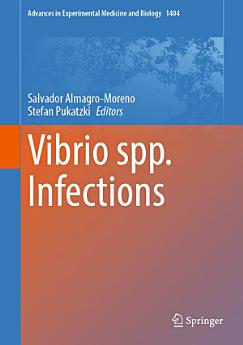Vibrio spp. Infections
About this ebook
This book is a valuable resource for health management professionals, experienced microbiologists/ microbial ecologists, and early career scientists alike who want to learn more about these important environmental human pathogens. The ideas and technologies presented in this book for preventing, controlling, and monitoring Vibrio spp. infections contribute to the UN Sustainable Development Goal 3: Good Health and Well-Being.
About the author
Salvador Almagro-Moreno is an Assistant Professor of Medicine at the University of Central Florida. He was the E.E. Just Postdoctoral Fellow at Dartmouth College in Dr. Ronald Taylor’s lab where he studied molecular pathogenesis and emergence of pathogenic Vibrios. His research interests include elucidating the molecular adaptations developed by bacteria in order to colonize the human host and how environmental factors affect their pathogenic potential. His research program focuses on two model systems as distinct paradigms of pathogen emergence: Vibrio cholerae, the etiological agent of the severe diarrheal disease cholera, and Vibrio vulnificus, an emergent pathogen that causes a deadly septicemia. His research approach strives to be holistic and multidisciplinary: “From Bays to Bases”. It encompasses a mix of molecular biology, genomics, phylogenetics, pathogenesis, and ecology.
Stefan U. Pukatzki is the Sharon D. Cosloy Professor of Biology at The City College of New York. He did his Postdoctoral studies at Harvard University in the laboratory of Dr. John Mekalanos where he co-discovered the Type VI secretion system in bacteria using Vibrio cholerae as a model system. His laboratory explores why a minority of bacteria evolved mechanisms to harm the human host. This behavior is not common, because symbiotic strategies to co-exist with the host are abundantly available. His research on host-pathogen interactions allows us to observe an “arms race” of attack over evolutionary time, which generates concepts and approaches that can be applied to develop alternative therapies to treat antibiotic-resistant bacteria.




